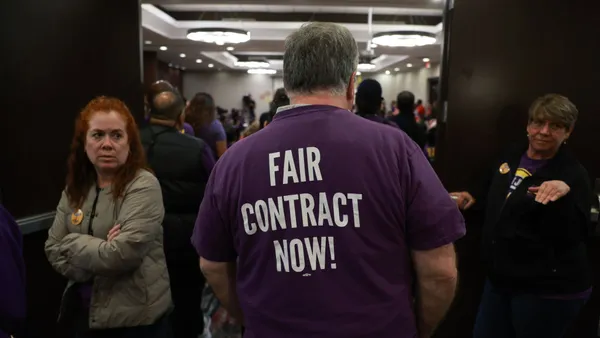Dive Brief:
- CBS Stations Group of Texas agreed to pay $215,000 to settle a U.S. Equal Employment Opportunity Commission (EEOC) lawsuit alleging that its Dallas/Ft. Worth station violated federal law by refusing to hire Tammy Dombeck Campbell for a full-time traffic reporter position because of her age.
- When the station's full-time traffic reporter resigned, the company looked for a replacement, advertising that the ideal candidate would have a strong knowledge of traffic in the area and bring at least five years of professional broadcasting experience, EEOC said. Rather than hire Campbell, who had worked for the station as a freelance traffic reporter, it hired a 24-year-old woman who was a former NFL cheerleader and did not meet the advertised job criteria. The station also made an offer to a 27-year-old woman.
- In addition to the monetary settlement, the station agreed to provide training on the Age Discrimination in Employment Act (ADEA), publish a notice of employee rights and report its compliance with the decree to EEOC.
Dive Insight:
The ADEA forbids discrimination on the basis of age against employees and applicants who are 40 years old or older. Even though the federal anti-discrimination law has been in place for many years, age discrimination remains a problem in the workplace, experts say. A recent AARP investigation found that ageism at work is widespread; more than a fifth of employees over age 40 in a Hiscox Ageism in the Workplace Study said they had experienced age discrimination in the workplace.
Several employers have settled claims of age bias in hiring recently. Earlier this year, PwC agreed to pay $11.6 million and change its recruiting practices to settle a claim that its targeting of recent college grads amounted to age discrimination. Norfolk Southern Corp., a freight hauler, likewise agreed to pay $350,000 in February to settle an EEOC age discrimination lawsuit alleging the freight transportation company refused to hire qualified individuals over the age of 51 for railway security positions.
Compliance with the ADEA can start with recruitment efforts, stakeholders say. When designing plans that attract a diverse pool of candidates, employers can include age in their inclusion strategies. Avoiding terms such as "established" or "digital native" can help, sources previously told HR Dive. It's worth noting, too, that experts say recruiting heavily based on social media can disproportionately attract younger applicants.
Employers can reduce discriminatory employment decisions in hiring, promotion and assignment by establishing written criteria tied to business needs for evaluating candidates and consistently applying the requirements to all candidates, the EEOC has said.













